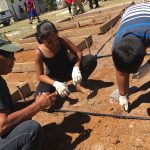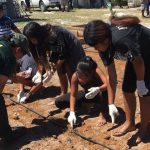Bringing community farmers back
As the CNMI government ratchets up efforts to prepare everyone for the economic stresses of the novel coronavirus outbreak, some members of the community are rallying to bring back the focus on farming with the launch of the Susupe Community Garden last Saturday.
The forces behind this effort—the Board of Parole, Department of Lands and Natural Resources, Northern Marianas College-Cooperative Research and Extension Education Services, Saipan Mayor’s Office, Miss Earth NMI, and Rep. Tina Sablan (Ind-Saipan)—came together to help create the first community garden project in the CNMI.
“This is really good timing,” Sablan said. “As everybody knows, we’re coming up on some very challenging economic times. All our families are going to be affected and this is a really good chance for us to go back to our roots, encouraging people to grow their own food in the community garden and in their homes.”
DLNR taught many children from the village on the proper way to plant seeds. One of the children, Kyra, said they are helping to protect the environment and to plant and have food.
Aside from being an avenue to raise food for residents in the area, the community garden is also intended to be the pilot project that would entice people, the youth included, to start doing more backyard gardening in their own homes.
Empowering farmers
“I want to bring back our farmers,” said Norma B. Carayoan, who works at the DLNR’s Division of Agriculture-Specialty Crop Block Grant Program, providing outreach, education, and training for farmers to increase the competitiveness of specialty crops on the island.
“We’re looking at critical things happening right now, and bringing back the farm life is the number one thing because right now, we don’t even know where we stand with the freight or shipping of our produce from the [United] States, so we got to look into farming,” Caraoyan added.
Since fiscal year 2019, the Division of Agriculture, through its five-member advisory panel, has been sub-granting over $300,000 to eligible applicants interested to farm, harvest, and market their specialty crops within the CNMI. Specialty crops are defined as fruits, vegetables, tree nuts, dried fruits, horticulture, and nursery crops, including floriculture.
Projects eligible for funding are community gardening, adopt-a-farm project, student farmer projects, “back to our roots,” school gardening, and data collection and marketing. In the past, projects on high tunnels, backyard gardening, school gardens, and hydroponics have been funded.
Carayoan has been outreaching the program at the Nutrition Assistance Program office, and is currently working on a project with the man’amko. Those who are also interested may call 256-3318 or 256-3319, or visit the Agriculture office in Kagman.
Promoting a safe and healthy community
Through Board of Parole chair Ramon B. Camacho, parolees are given the opportunity to get reintegrated to the society and to give back to the community through the community garden project.
One of the parolees, Ray King, expressed appreciation for having been given the opportunity to establish a place for the community to start their own agricultural garden.
“The place that we have there [in Susupe] is the beginning station for the community to get the sprout and to develop their own garden…so instead of going to the market to buy vegetables and fruits, they have their own store in the backyard. It’s a nice way to start to give back to the community,” King said.
Camacho stressed that the community garden is a perfect area for the people to get together, work together, converse, and build a bond that could help people go through hard times.
“Here on the island, we have two major resources, water and land. We have to make use of it. Now that we have this impact, if there is no air, water transportation to bring the commodities, what are we going to put on the dining table? With no tourists coming in, [we need to] make sure that we still survive. Let’s start building relationships with our neighbors,” he added.
Agroforestry and stewardship
“Agroforestry is sustainable,” NMC-CREES extension agent Arnold Route stressed.
With news of people panic buying for food and goods around the world due to the coronavirus scare, some residents are realizing that there should be less dependency on external factors, and that food sustainability within the island is key.
Emphasizing food security, Route cited the other advantages of agroforestry: that it can be done in small areas such as homestead lots, it provides organic matter and nutrients, it provides soil with moisture, and it provides for wildlife habitat, with birds even helping with propagation.
DLNR Forest Stewardship program manager Pedro Tudela appealed to the community to protect and take care of the plants. Those who want to start a backyard garden can get the plants for free at CNMI Forestry.
“Come up to CNMI Forestry if you are interested. There is no money to pay, it is free. Everything is free,” Tudela said. “Gardening is the work of a lifetime. You never finish. I hope that while so many people are out there smelling the flowers, someone is taking the time to plant some.”
- The Board of Parole, Department of Lands and Natural Resources, Northern Marianas College-Cooperative Research and Extension Education Services, Saipan Mayor’s Office, Rep. Tina Sablan, and a number of children from the village came together last Saturday to start planting crops on the Susupe Community Garden, the first in the CNMI. (IVA MAURIN)

























